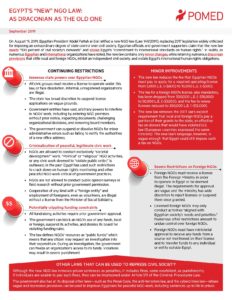Hosni Mubarak, the autocratic ruler of Egypt whose nearly 30 years in power came to an abrupt, bloody climax in 2011 after a popular revolt swept across the Arab world, died Feb. 25 at 91, The Washington Post reports (HT:FDD):
The Arab world’s most populous nation continues to lag behind other developing countries. Egyptians who advocate liberal reforms or even free speech are still relentlessly persecuted. Islamists remain the strongest opposition force. Sadly, the repressive, stagnant regime that Mr. Mubarak created has become Egypt’s standard.
Human rights activist Mohamed Zaree said autocracy and economic hardship were now worse under President Abdel Fattah al-Sisi than under Mubarak, Reuters adds:
Sisi, who came to power after leading the overthrow of Mubarak’s Islamist successor, Mohamed Mursi, has overseen a broad crackdown on dissent, which rights groups say is the most severe in recent memory.
“Mubarak’s era was painful (but) this era is much more difficult and painful in terms of freedoms and economic conditions,” Zaree said.
 Aida Seif El-Dawla, of the Nadeem Centre for Rehabilitation of Victims of Torture and Violence, who has worked with victims of torture under both Sisi and Mubarak, said the latter “left behind someone who will outlive us,” in reference to Sisi, The Guardian reports.
Aida Seif El-Dawla, of the Nadeem Centre for Rehabilitation of Victims of Torture and Violence, who has worked with victims of torture under both Sisi and Mubarak, said the latter “left behind someone who will outlive us,” in reference to Sisi, The Guardian reports.
She said: “I don’t know if it’s nostalgia, but compared with the nightmare we’re living now … during Mubarak it was tough, torture was rampant and people were in prison. But he and his entourage were political, so sooner or later they had to submit a little.” She described life under Sisi’s rule as “revenge for having revolted against Mubarak”.
For Mr. el-Sisi, Mr. Mubarak represents a complex figure — the leader whom Egyptians ousted in a popular uprising, yet, like him, a military-backed authoritarian, The New York Times reports.

POMED
Ultimately, Mr. Mubarak’s legacy may be Mr. el-Sisi’s iron-fisted rule, said Andrew Miller of the Project On Middle East Democracy (POMED). “Mubarak is gone, but 100 million Egyptians still live in his Egypt,” Mr. Miller told the Times. “Sisi is worse than Mubarak in many ways, but without Mubarak there is no Sisi. That is Mubarak’s legacy.”
Michele Dunne, Middle East program director at the Carnegie Endowment for International Peace and a National Endowment for Democracy (NED) board member, speaks with NPR’s Mary Louise Kelly about the late Egyptian dictator and the Arab Spring.
It was under the influence of Gamal, his son, that Mubarak agreed in 2004 to open up the economy and boost exports through steps such as a devaluation of the currency, The FT’s Heba Saleh adds:
The reforms paid off in the form of accelerated growth but were seen to benefit a class of crony capitalists around Gamal. Perceptions of corruption and a widening gap between rich and poor fostered public resentment. The regime tried to pre-empt social unrest with increased spending on fuel and food subsidies but it drained resources away from services such as health and education. In the final years before his 2011 downfall Mubarak was seen as arrogant, aloof and dismally out of touch with his people.
Of the many reasons why Egypt’s democratic transition failed, perhaps the most crucial one was
that the main players—the army, secular parties, Islamist movements, and Mubarak’s men—never sought to reach agreement on how to engineer the transition period after Mubarak’s removal, according to Nagwan Elashwal, a PhD researcher at the European University Institute, Italy. Instead, there was a rush to hold referenda and elections, to selfishly pursue narrow interests, and to exclude Mubarak-associated politicians and interest networks, creating spoilers with a clear incentive to derail the nascent democratic process, she wrote for a recent POMED survey on why Egypt’s democratization failed.
 His years in power were shaped by a fierce defense of secularism, a rivalry with Iran and its Arab clients and a willingness to buck popular sentiment to endear his nation to Western benefactors. At his core, he held an unwavering belief that only a heavy hand was capable of ruling the Arab polity, The Wall Street Journal reports.
His years in power were shaped by a fierce defense of secularism, a rivalry with Iran and its Arab clients and a willingness to buck popular sentiment to endear his nation to Western benefactors. At his core, he held an unwavering belief that only a heavy hand was capable of ruling the Arab polity, The Wall Street Journal reports.
“Mubarak continues to state that in his view Iraq needs a ‘tough, strong military officer who is fair’ as leader,” wrote Margaret Scobey, the U.S. ambassador to Egypt, in a 2009 cable posted on WikiLeaks that discussed how to stabilize the war-shattered country. “This telling observation, we believe, describes Mubarak’s own view of himself.”
Nine years after the Egyptian Arab Spring protests began, al-Sisi has built on Mubarak’s style of authoritarian governance, POMED adds. Some remember Mubarak’s rule as a slightly better time for Egypt: Robert Springbord, a professor at King’s College in London, notes that Mubarak’s rule “had several positive features, especially as compared to the present one.” POMED’s Amy Hawthorne told Euronews Tonight that while Mubarak “[brought] a certain measure of political stability to Egypt…the price that was paid for that stability was atrophy and deterioration of the political institutions, of the economy, of socio-economic conditions.”







